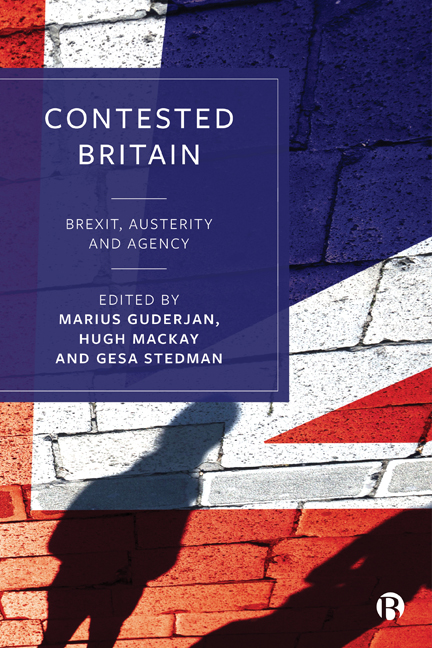Conclusion
Published online by Cambridge University Press: 10 March 2021
Summary
Introduction
This book has explored dimensions of contestation in British society, politics, economics and culture. It has treated Brexit not as an isolated phenomenon but as a reflection of broader social processes, some of them distinctly British, others comparable with issues and events in other parts of the world. Organizing the book around the themes of agency and austerity has allowed us to make sense of this political conjuncture.
This conclusion reflects on the developments since the EU referendum was announced. It revisits the relationship between Brexit, austerity and agency and identifies the common themes addressed in the individual chapters while linking them together as well as drawing connections between them. The chapter addresses the question of how to overcome Britain's current social, political, economic and cultural challenges by restoring agency. The multidisciplinary insights of the case studies in this volume enhance our understanding of the conditions, agents and actors, and types of action that inform an agency-centred analysis.
Three phases of Brexit
Brexit was a reaction against globalization and a strong corrective to the integration of Europe which has been a political trajectory since World War II. It also reflected the specific history and culture of the UK, particularly its post-colonial standing. That it surfaced in Britain and took the form it did, reflected some core dimensions of British society. At the same time, however, the result of the EU referendum was due to its ad hoc and opportunistic nature. Unlike the Scottish independence referendum, which took about seven years of preparation by officials and at least two years of well-informed debate, David Cameron announced the date of the referendum only four months in advance in the hope of settling the EU debate quickly within his party. Far from settled, Brexit has been a messy process, leaving citizens and politicians, outside and inside the UK, frustrated and uncertain.
Four years after the announcement of the referendum one can distinguish three distinct phases of Brexit. First, the run-up to the referendum, which was characterized by the oddly skewed campaign by the Leave camp, the lack of active support for Remain on the part of the Labour leadership, and a rather lackadaisical approach by some voters who had never thought that the issue, which had for many years interested only the Tory Party, would one day affect Britain as a whole.
- Type
- Chapter
- Information
- Contested BritainBrexit, Austerity and Agency, pp. 233 - 246Publisher: Bristol University PressPrint publication year: 2020



